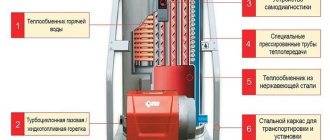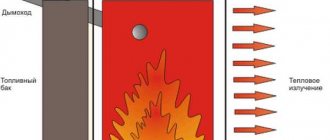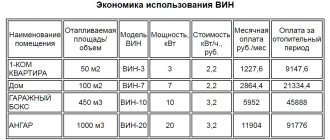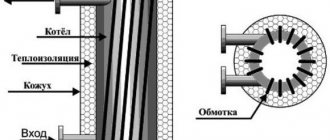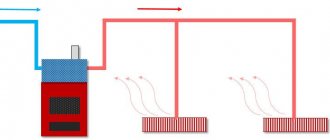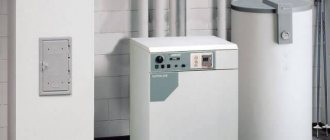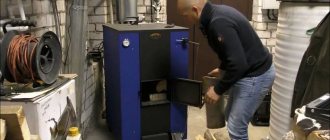Expenses
How to calculate diesel fuel consumption for heating during the season and, most importantly, your costs?
- For the center of the country, with good insulation of the house, you can take the approximate need for thermal energy as 1 kW per 10 m2. Yes, such a scheme is greatly simplified and gives rather mediocre accuracy; but an accurate calculation of the heat requirement is still beyond the scope of the article.
- As practice shows, burning a liter of diesel fuel produces about 10 kilowatt-hours of thermal energy. To provide heat to a house of 100 square meters during the peak of cold weather, we need to burn a liter every hour.
- Again, turning to practice - a correctly calculated heating installation ON AVERAGE operates at half the rated power. That is, if calculations showed that we need a 10-kilowatt boiler, then half the time it will operate at full power and half the time it will be idle. Therefore, in practice, the average fuel consumption will be halved and amount to 1/2 liter per hour.
A month is, as you can easily calculate, 720 hours. The instructions for further calculation are quite simple: we multiply hourly consumption by 720 and get 360 liters of diesel fuel per month, which at current prices will result in 32.5*360=11,700 rubles at the rate of 32.5 rubles per liter.
It is easy to judge the immediate prospects from the table of world fuel prices. We are still moving towards a market economy, which implies leveling prices at the general level.
Where does diesel heating begin?
Today, diesel heating of a country house is not a problem. After all, you can find many companies that offer diesel boilers. The efficiency of such boilers is 75-85%. It all depends on what design features the boiler has and what type it has. Double-circuit boilers can not only heat the house, but also be used to supply hot water.
Boiler room of a private house
Of course, the first thing that all home owners ask when choosing a heating system is: what will be the consumption of diesel fuel for heating the house? Based on statistics, fuel consumption during constant operation is 0.9 liters per hour. Average figures are 0.5-0.7 liters per hour. However, such indicators can only be achieved if your house is very well insulated.
Autonomous heating using diesel fuel is provided by the boiler. And before purchasing it, you need to decide on the installation location.
In this case, you can focus on the requirements for gas boiler houses: area from 4 sq.m for each boiler; ceiling height from 2.2 m; doorway from 80 cm; window of 10 cubic meters, 0.3 sq.m of window; supply ventilation 8 sq.cm per kW of boiler rated power or 30 sq.cm per 1 kW with air supply from the interior; the chimney cross-section is not less than the boiler outlet cross-section; ground loop bus; natural supply ventilation channel 30 cm from the ceiling; power supply on a separate machine; diesel fuel for heating - a supply of no more than 800 liters in the boiler room.
Air heating of a country house and garage
Heating system with diesel boiler
When you are setting up a diesel boiler room, you need to pay attention to the fact that to work with a turbocharged burner you do not need to install a complex special chimney. You can simply buy a coaxial chimney and output it through the wall. Thanks to such a pipe, combustion products will be effectively removed, and clean air will be taken inside.
It is worth noting that in modern times you can also find boiler models that allow you to remove a diesel burner and install a gas one. This will save you money if you plan to switch to gas in the future.
Calculation of power and fuel consumption of a diesel boiler
Heating efficiency and fuel consumption depend on the correct choice of boiler power. This indicator is measured in kilowatts and is indicated in the device passport. To calculate the required power, you need to focus on the heated area of the house.
In regions with a temperate climate, the following principle is used for calculating the required power - the sum of the areas of all heated rooms is divided by 10 and the required power is obtained. This calculation is suitable for one-story buildings with a room height of no more than 3 meters. Otherwise, the calculation is based on volume.
Fuel consumption depends on the power of the unit. To determine the fuel consumption, the power of the heating equipment is divided by 10. As a result, the diesel fuel consumption is obtained in kg/hour when the device is operating in the coolant heating mode. If the device operates in the mode of maintaining the temperature of the coolant, then the consumption is reduced by 30-70 percent (the exact number depends on the quality of the building’s insulation).
Equipment classification
Depending on the requirements for the equipment, a specific boiler model is selected. Characteristics that are important when selecting a heating boiler:
- power;
- combustion type;
- heat exchanger material;
- fuel consumption;
- additional possibility of heating water.
Inside view of an oil-fuel boiler Source stroyfora.ru
See also: Catalog of companies that specialize in insulating houses.
Power
The efficiency of diesel fuel consumption and the operating efficiency of the unit depend on the power consumption. The generally accepted unit of power measurement is kilowatt. This characteristic must be reflected in the documentation supplied with the boiler.
The selection of a model based on power must be made based on the area of the heated room of the house. Calculating the required power is quite simple: sum up the area of all rooms, and the resulting amount must be divided by 10. This formula is used to determine the power of a boiler for a house located in a temperate climate.
This calculation method is suitable for rooms in which the ceiling height is no more than 3 m. If the building is located in an area with a cold climate, then the calculated power of the unit must be increased in the range from 20 to 30%.
Comparison of the power of boilers of different types in the table Source pechilux.ru
Determination of fuel consumption
Diesel heating of a private home requires significant consumption of diesel fuel. This indicator depends on the power of the boiler equipment. The amount of fuel can be calculated using the formula: divide the boiler power by 10. The resulting quotient is the hourly fuel consumption (in kilograms) during heating.
In temperature maintenance mode, fuel consumption is significantly reduced. How economically diesel fuel will be consumed depends on the quality of the building’s thermal insulation. If it is weak, the flow rate will decrease by a third; if it is good, it will decrease by up to 70%. The average fuel consumption for a private home is usually from 500 to 900 grams.
Boilers for heating and heating
Diesel boilers can be used not only to heat a house, but also to heat water. Devices that combine both of these functions are called dual-circuit.
If this is the option you need, the calculated power must be increased by a fifth. This factor must be taken into account immediately. Otherwise, the power of the diesel boiler may not be enough for both water heating and heating.
Heating system for heating a house and heating water Source teplotehnika.msk.ru
Heat exchanger: choice of material of manufacture
The boiler heat exchanger material is one of the important parameters. During fuel combustion, soot is formed, which, when combined with condensate, leads to corrosion and failure of the unit. Each heat exchanger material has its own strengths and weaknesses, including resistance to corrosion and temperature changes.
Cast iron
A heat exchanger made of cast iron has higher corrosion resistance compared to steel. But at the same time it can crack due to temperature changes. Cast iron is heavier than steel and its price is higher.
Steel
The steel body is lighter and cheaper than cast iron, it is resistant to temperature changes, but is susceptible to corrosion. Stainless steel has the best performance qualities. But such a boiler will cost more.
When choosing a diesel boiler, you can start from financial capabilities, but do not forget about the quality and duration of operation Source happymodern.ru
Drip stove
It is well suited for small spaces and is easy and quick to make. This is an ideal device for heating a camping tent and small structures. Here is the step-by-step process of creating a heater with your own hands:
- are determined with the object for which the device is created. For a small room 3*3 m you will need a box 30*30*45 cm;
- depending on the size of the stove, you can take a fire extinguisher and saw off the bottom, or a 200-liter tank (for a large appliance). These elements serve as the cabin of the heating vehicle;
- For diesel fuel you will need a 2 liter medical burner. A small-diameter copper tube 1 m long is connected to the rubber hose with which it is equipped; it must be bent at a right angle;
- the hose is bent in half, a clamp is fixed at the bend to secure the stove elements. The screw is installed so that the liquid drips slowly;
- A rag is placed inside - this is a wick. It is saturated with diesel fuel; a good material for it would be cotton briquettes from an old mattress;
- the door is installed;
- in the body in the center or near the door itself, but not near the pipe, a hole is drilled to fit the diameter of the copper tube;
- the rag is set on fire, fuel slowly drips onto it - this is how this stove works.
How to choose the right diesel boiler
A diesel fuel boiler can heat a building of any size. For this purpose, models are available for sale that differ in power - up to 100 kW. Thanks to this, consumers have the opportunity to quickly select a model that suits its characteristics. Diesel boilers also differ in some other parameters:
- Type of combustion chamber used;
- Number of working circuits;
- Operating principle – traditional or condensation;
- Control type – mechanics or electronics.
Let's figure out how to choose the right diesel heating boiler.
Combustion chamber type
Diesel fuel in diesel boilers can burn in two types of chambers - open and closed. Open chambers (atmospheric boilers) burn fuel with a natural supply of oxygen, while models with closed chambers are equipped with fans that create artificial draft. The former are simple, but the latter are characterized by higher efficiency.
Atmospheric diesel fuel boilers require a traditional chimney. If you already have one in the house, then you don’t need to think much about it – feel free to buy a model with an open chamber. If you want to avoid fussing with a chimney (and its construction costs time and money), you should take a closer look at a unit with a closed chamber (turbocharged type). For its operation, you will need to purchase a special coaxial chimney, which is led outside the nearest wall to the street.
Classic and condensation models
Condensing boilers using diesel fuel are good because they have increased efficiency. They extract the generated heat to the maximum, for which additional heat exchangers are provided in their design. As a result, the combustion products at the outlet have an extremely low temperature - condensation occurs, which requires its disposal into the sewer system. Condensing units are noticeably more expensive, but they save 10-15% of fuel and take care of the environment.
If the money in your budget for heating is strictly limited, we recommend buying a cheaper classic unit that extracts heat according to the traditional scheme. The efficiency here is slightly lower, but the price of the equipment is more affordable - that’s all the differences.
Number of circuits
Organization of hot water supply is an eternal problem where there is no centralized supply of hot water. Consumers use boilers, install hot water heaters in their homes and apartments, and purchase instantaneous water heaters for tap use. If you install a diesel boiler in your house, you should take a closer look at dual-circuit models - they will provide the premises with heat and supply hot water to the taps.
Double-circuit diesel boilers have a more complex structure. This fact directly affects their cost and level of reliability. Therefore, some consumers are wary of them. If you don’t want to purchase a double-circuit unit, we recommend adding an indirect heating boiler with a built-in heating element to the heating unit. In winter it will work from the heating system, and in the warm season - from the mains.
If there is no need to prepare a large amount of hot water, limit yourself to installing an electric instantaneous water heater (do not buy a “faucet” model, buy a normal unit with wall mounting).
Control type
The fewer parts, the fewer breakdowns - this is an almost unshakable rule. Therefore, diesel fuel boilers with simple mechanical controls last significantly longer and break down less often. But models with electronics are more accurate and economical. They can be controlled from built-in and remote controls; they have more service functions. If you have extra money in your pocket, their purchase is completely justified.
Thermal power
Since we are considering diesel heating boilers for home use, to calculate the required thermal power we can use the usual formula - for every 10 sq. m. area requires 1 kW of heat. Knowing the area of the house, we can calculate the required area. These calculations take into account regional coefficients and take into account heat losses in individual rooms - we have already written about all this more than once in our reviews.
How to decide on the manufacturer?
Another important point is the manufacturer. The fact is that there is high-quality equipment, and there is not so much. So, at first glance it is quite difficult to understand what exactly you are dealing with. In most cases, you need to look at the company's notoriety. For example, the Kiturami diesel heating boiler, regardless of the model, is in good demand. At the same time, the number of positive reviews reaches 95%. This suggests that this company produces quality products. The same applies to Germany, which supplies Logano diesel boilers to our market. Although they have a high cost, they are distinguished by a long service life, high reliability and efficiency. In general, it makes sense to take a closer look at domestic manufacturers, since our companies make very high-quality equipment. At the same time, its price is significantly lower than European models.
Features of choosing a diesel boiler
Boiler size table and fuel consumption
To keep diesel fuel consumption to a minimum, you need to clearly know which diesel boiler is better. Therefore, it is worth considering its design features and making the right choice.
First of all, the heating unit is selected based on the material from which its heat exchanger is made. There are three types:
- Cast iron.
- Made from ordinary steel.
- Made from alloy steel.
All experts agree that the first option is best. The fact is that when diesel fuel, which contains a lot of sulfur, burns, condensation forms and settles on the surface of the heat exchanger. And this is the beginning of the corrosion process. A cast iron element with thick walls will last at least 30 years. Steel - no more than 20 years. But heat exchangers made of alloy steel are most likely a rarity, because they increase the cost of boilers. They are used in premium units. They serve for a long time, and their heat transfer efficiency is 98%. Here is a great opportunity for you to save on fuel consumption.
The second choice is the injector. This element differs in many ways. Here are the dimensions, the shape, the method of spraying, the power, and the spray angle. Today, manufacturers offer nozzles whose power can be adjusted. This makes it possible to calculate the volume of liquid fuel consumption.
What do the experts offer? The best option is narrowly targeted nozzles that operate only on diesel fuel. Bi-fuel burners, operating on both gas and liquid fuel, are very difficult to operate and have low efficiency.
Oilon diesel burner
Most often, injectors are purchased as a separate unit.
Therefore, it is worth paying attention to models from the same manufacturer as the boiler itself. If you can’t find one, you’ll have to take what’s in the store. But keep in mind that cheap burners mean higher consumption and shorter service life
Choose models from well-known manufacturers, and a specialist will configure them for the required brand of diesel boiler
But keep in mind that cheap burners mean more consumption and a shorter service life. Choose models from well-known manufacturers, and a specialist will configure them for the required brand of diesel boiler.
Operating principle of a diesel boiler
In order to understand the principle of operation, let’s consider the basic components of a diesel boiler and their purpose:
- A pump that ensures the flow of diesel fuel into the burner.
- A fan that supplies air to the combustion chamber.
- Chamber for preheating fuel. Not installed on all devices. Inside, the fuel is heated and filtered before being supplied to the burner.
- Diesel burner. It receives fuel, which is sprayed into the combustion chamber through a nozzle. A fan or turbine is used to create pressure inside. According to the method of power control, the following configurations are distinguished: Single-stage models with constant power.
- Two-stage devices with two modes
- Modulating burners, the power of which varies depending on the set temperature.
Diesel boiler in section
- Metal heat exchanger. It consists of tubes that are heated by the heat released during fuel combustion. Inside them there is a coolant, which is distributed through the radiators using a circulation pump. Made from stainless steel, copper or cast iron.
- Chimney. Combustion products and residual vapors are discharged here. In modern configurations, there is also part of the heat exchanger, which is heated by the escaping smoke and steam, which allows increasing the efficiency of the device.
- Electronic control system. Coordinates the operation of all components of the liquid fuel boiler according to user settings.
- The body is made of steel and is additionally covered with a heat-insulating gasket from the inside.
The pump pumps fuel into the preheating chamber, then it enters the diesel burner and is sprayed into the combustion chamber through a nozzle under pressure from the internal fan. On the other hand, oxygen is supplied to the furnace, pumped by a fan. The electrodes create a spark and ignite the mixture of air and fuel.
The heat is transferred to a heat exchanger, which is located around and on top of the combustion chamber. The coolant is heated inside it and circulates through the heating system. Combustion products are discharged through the chimney. All components are coordinated by an electronic control system, which sets the required operating mode and temperature.
Kiturami boiler control system
Dual-circuit models are also produced that have an additional heat exchanger for domestic water. Usually it is located above the main one and allows you to provide the house with hot water supply.
If you want to provide domestic hot water using a single-circuit boiler, you need to additionally install an indirect heating boiler. Some double-circuit devices are equipped with a small indirect heating boiler instead of a second heat exchanger.
Multi-fuel combi boilers
But boilers operating on two types of fuel are not all types of combined heating devices. There are also multi-fuel boilers, which are often called universal. They are often equipped with several fireboxes at once, and the transition from one fuel to another can be done manually or automatically.
Combination: Gas - Diesel - Electricity
Boilers of this type are used mainly in rooms with large areas, but only as an additional source of heat, in combination with the main one. The fact is that such combined heating boilers do not have sufficient power to heat houses efficiently.
How to choose the optimal diesel boiler
The advantage of choosing diesel devices is due to the fact that most models are capable of running not only on diesel fuel, but also on alternative types of fuel, for example, liquefied gas.
To choose the optimal model from a large range of offers from leading manufacturers of heating equipment, you need to compare all the parameters.
When choosing a heating boiler, an important indicator is the type of burner used
Therefore, its characteristics should be given special attention:
- A replacement burner costs a little more than a built-in one, but it allows you to use not only diesel fuel, but also natural gas for heating.
- Burner equipped with a heating system. allows you to significantly save fuel consumption.
Advice: it is recommended to purchase a noise-absorbing casing for the heating system, which will reduce the noise level when the boiler is operating.
An important parameter is the boiler power. It is determined from the consumption of 1 kW for every 10 square meters of room area. If the purpose of installing a boiler is not only heating, but also supplying hot water, then it is better to choose a boiler with a little more power.
- This publication is devoted to choosing a reliable sawdust boiler.
- In this material we talk in detail about induction heating boilers.
- Read about organizing a single-pipe heating system here.
Advice: in order for the boiler to cope with all its functional responsibilities, its power should be slightly greater than that required to heat the selected room.
The main question of interest to every buyer is the fuel consumption of the selected model. Finding out this parameter is not at all difficult; fuel consumption in kilograms per hour is equal to a tenth of the power of the burner used. Depending on this indicator, you can select a boiler. service that you can afford.
The material from which the firebox is made affects the durability of the device. A steel boiler will be more economical, but will last no more than 15 years. In turn, a cast iron product consumes more fuel, but has a service life of at least 50 years.
Remember: the best option would be to purchase a universal boiler that can operate not only on diesel fuel, but also on liquefied gas, kerosene, and fuel oil. This will allow the heating process to continue if the fuel runs out.
Camper Heating Options
The following sources of thermal energy can be used to heat motorhomes:
- Electricity;
- Solid fuel (firewood, pellets, pressed sawdust, coal);
- Liquid fuel (gasoline, diesel fuel);
- Gas.
Let's briefly consider each of the sources of thermal energy and try to choose the most optimal option for heating the camper.
Camper heating with electricity
Electric camper heating is not even considered as the main source of heating. Electric radiators and underfloor heating systems require connection to a 220 V network and a current power of at least 10 A. This is only possible in equipped parking lots.
When installing solar panels, you don’t have to worry about finding a comfortable campsite, but can use electric heating and any electrical appliances anywhere in the campsite
While on the road, electric heating is out of the question, but in established campsites, electric convector heaters can come in handy to maintain a supply of the main heating source.
Solid fuel for the stove
Basically, firewood is used as solid fuel. The heater is not a full-fledged fuel boiler, but an ordinary potbelly stove.
This heating system is only effective for short trips of 2-3 days.
A wood boiler does an excellent job of heating a camper, but is only suitable for short trips due to the need for a supply of firewood, which takes up a lot of useful space and burns out very quickly
For a long trip you will need a lot of firewood, their placement will reduce the spacious area of the module. And the autonomy of such heating is out of the question, since the firewood burns out very quickly and you constantly need to be distracted by servicing the stove.
An alternative to firewood can be pellets or pressed sawdust, called Eurofirewood. Although they are consumed much more slowly, they will still require a large area to accommodate their supply.
Liquid fuel heaters - gasoline, diesel fuel
Gasoline or diesel fuel can be used as liquid fuel. They are taken directly from the tank. The advantage of such a system is its location.
It is located under the floor of the camper, which allows rational use of the space of the motorhome. During the cold season, such a system can be used to warm up the engine before starting.
Diesel heaters are distinguished by their compactness, do not require additional space and do not reduce the useful volume of the module, but create quite a lot of noise during operation
The disadvantage of liquid fuel heaters is the high noise level during their operation. Even with perfect sealing of the windows and door of the camper, it will not be possible to completely avoid the smell of gasoline or diesel fuel in the room.
In addition, you will have to constantly monitor the fuel level in the tank, since in the cold season its consumption increases significantly. Stopping with an empty tank several tens of kilometers before a gas station is not the best travel option.
Gas-fired camper heaters
The main advantage of gas heaters is their higher efficiency compared to electricity, liquid and solid fuel. In addition, such heaters are characterized by their autonomy.
Modern automation of gas equipment allows you not only to select the operating mode, but also to fully automate the operation of the heating system.
Gas heaters allow you to regulate the heating intensity, and modern automation not only automates the operation of the system, but also ensures its safe operation
Compact standard-sized gas cylinders can provide camper residents with heat and a sufficient supply of hot water for a week, even in the cold season. If necessary, standard cylinders can be replaced with cylinders of larger capacity, thereby increasing the fuel supply by 8-10 times.
Due to their autonomy, comfortable operation and high efficiency, gas heaters for garages and campers are the most popular among most caravanning fans.
Therefore, we will dwell on gas camper heating in more detail, consider the principle of operation of the equipment, installation features, as well as safety measures during their operation.
Diesel or gasoline – which is more economical?
All other things being equal, the consumption of a diesel generator is less than that of a gasoline generator.
Therefore, gasoline generators are often used for short-term operation; it is not economically profitable to use them for continuous operation. Diesel generators can become the main source of energy, operating for a long time and consuming less fuel. Gasoline is used in small installations - starting from 0.75 kW, diesel models can be found starting from 3 kW.
In numbers, fuel consumption looks like this:
| Generator | Petrol | Diesel |
| 5 kW | 2.3 l | 1.4 l |
| 6 kW | 2.7 l | 1.9 l |
| 10 kW | 4.9 l | 3.0 l |
In addition to the fact that diesel engines themselves are more economical, SKAT generators are equipped with a Bosch injection system, which additionally saves fuel up to 15% and reduces smoke and CO content in the exhaust gases.
The principle of operation of the system is as follows: injectors inject fuel directly into the combustion chamber. This increases the pressure in the chamber and gives high torque with lower fuel consumption - up to 15%. The latest improvement to the system was the use of a laser to produce holes in the injectors. Now the fuel atomization has become more finely dispersed, due to which mixture formation occurs more accurately, and the fuel burns more efficiently with minimal emissions into the atmosphere.
Advantages and disadvantages
Let's move on to analyzing this type of fuel. What to expect from him?
Advantages
- The mentioned ability to control the boiler without human intervention is a huge plus. For a city dweller accustomed to comfort, the need to chop wood and light the boiler several times a day will turn life in nature into real hard labor. Here you can completely forget about the problems of heating your home.
- The price per kilowatt-hour of thermal energy obtained by burning main gas will, of course, be lower. However, gas pipelines are not available everywhere. The cost of connection with obtaining all permits in the Moscow region often reaches a million rubles, and the time frame can exceed a year.
Here everything is simple: just buy a boiler, install a container in the yard - and your home will be warm.
Power in rural areas is often provided by prehistoric equipment. Hence the power limitations.
Flaws
- Again, looking ahead: operating costs when heating with a solarium are VERY high and do not differ much from the costs when using bottled gas or electricity. In the latter case, we are, of course, talking about direct heating: ANY heat pump is much more economical.
- The boiler itself is somewhat more expensive than a gas analogue of identical power due to a more complex burner. Taking into account the need to purchase a container for storing diesel fuel (usually 4-10 m3) and installing a fuel line, equipment for diesel fuel will not be cheap.
- The burner of this type of heating device is VERY noisy due to the pressurization. Hence the conclusion: a solar boiler can only be installed in a separate room. Another argument in favor of this solution is the smell of diesel oil.
- All devices of this type are highly dependent on the quality of diesel fuel. Purchasing a cheap solarium can result in expensive boiler maintenance.
- The prospects are quite gloomy. Like all fuels produced from fossil raw materials, solar oil will only become more expensive over time.
- The container will take up quite a lot of space in your yard and will definitely not decorate the local area.
For quickly heating a small room, the stove in the photo is almost ideal.
How to save on fuel? Criteria for choosing heating equipment
Units consuming liquid fuel are designed for both one and two circuits. And it is quite obvious that in the second case, fuel consumption will be greater, which will only increase costs. For this reason, the best option for dual-circuit appliances can only be to reduce the consumption of hot water, which will help save on fuel.
Experts advise one more thing. According to them, fuel consumption can also be reduced by setting a lower temperature for the coolant. And the final point - it is advisable to install a thermostat in the warmest room. If you follow all these recommendations, you will be able to reduce the fuel consumption required for the operation of the boiler and save a certain amount of money.
On many thematic forms, users are interested in: which units are more economical - diesel or electric? And what is the general fuel consumption of a diesel heating boiler? It is quite difficult to answer this question unambiguously, since it depends on a number of factors, including:
- quality of building thermal insulation;
- cost of the fuel used;
- area of the heated room;
- features of a specific climate zone;
- number of residents in the house.
And if you know about all these factors, then you can roughly calculate the consumption of both fuels by comparing costs. And now - some more practical advice regarding the choice of a heating unit.
- Heating equipment that consumes diesel fuel, if there is a combustion chamber made of steel, will be immune to temperature changes. At the same time, steel undergoes a rusting process, so it does not last as long as, for example, cast iron.
- The higher the cost of a heating boiler, the higher the risk that its maintenance will cost you very much (when compared with models that have a lower cost).
- Devices that are equipped with a cast iron combustion chamber can last up to twenty years, but temperature changes affect them quite significantly. In this kind of heating systems, it is necessary to install valves that will mix the heated liquid into the return pipeline. All this is required so that the combustion chamber simply does not split.
Video – Diesel heating boiler – fuel consumption
https://youtube.com/watch?v=ZRj1PzbcBNs
Why diesel fuel?
When choosing a heating boiler, each user is guided by specific individual requirements. And if you, for example, live in a locality where there is no centralized gas supply or there are frequent fluctuations in the power supply, then diesel fuel boilers, the consumption of which, as we have already found out, is insignificant, will be the most optimal option.
Moreover, such devices have one more advantage that we did not talk about - the fuel container can be installed in any place convenient for you. And this has become a decisive factor for the fact that the popularity of diesel equipment has only been increasing in recent years.
How to calculate:
To heat every 10 square meters of housing, it is generally accepted that 1 kW of boiler power is needed. This formula can be used with conventional insulation that has been installed in accordance with building codes. So, for a living space of 150 m2 you will need a device with a power of 15 kW. If the boiler operates at maximum, diesel fuel consumption will be 1.5 kg per hour. Therefore, the daily consumption can be calculated by multiplying 24 hours by 1.5, which gives a total of 36 kg.
On average, the boiler operates at maximum power for 4 months (120 days), which means that heating this period will require 4320 kg of diesel fuel (120 * 36). For another 3 months the equipment works at half power, and consumption is 1620 kg (90*18). By adding the two results obtained, you can see that over 7 months of operation of the heating device, it will need 5940 kg of diesel fuel. These are approximate calculations.
However, when faced with the purchase of such a boiler, it is better to give preference to those models that have automatic modes - this will ensure economical consumption of diesel fuel. When making such calculations, it should be taken into account that in the same region, but in different places, the temperature may differ by several degrees, and this, in turn, will necessarily affect fuel consumption.
Diesel fuel consumption per day
You can calculate diesel fuel consumption using the following formula: 10 kW = 1 kg diesel fuel. This amount of kilowatts is enough to heat a room of 100 square meters. Based on this, the boiler will consume 24 kg of fuel per day.
Thermal insulation and diesel fuel consumption
An important role in the consumption of diesel fuel by a boiler is played by the material from which the walls and floor of the room are made, as well as what kind of thermal insulation material they are covered with. Here its thermal conductivity should be taken into account. For example, to provide the same level of protection from frost, polystyrene foam will need 12 centimeters, and wood - 45 cm. How to reduce fuel consumption First of all, you should focus on the thermal insulation of your home. The materials and heat saving methods used today make it possible to reduce the period during which it is necessary to heat the room and preserve the heat produced. Increasing the sections in the radiator also helps to save diesel fuel, since the coolant temperature will decrease slightly. Proper adjustment of the burner can add 10-15% savings. Installing a room thermostat will avoid overheating of the home, and also automates the control of equipment. To get the maximum benefit from using a diesel fuel boiler, you need to correctly design the heating system and correctly configure the automation. Reasons for excessive fuel consumption
On average, daily diesel fuel consumption is 1 kg/60 min. at 10 kW power. The permissible deviation can be up to 10%. The reasons that contribute to excessive consumption of diesel fuel may be the following:
- Incorrect burner adjustment. During operation of the boiler, it burns the fuel-air mixture, and not the diesel fuel itself. In order for everything to burn completely, you need the correct ratio of air and diesel fuel. An incorrectly configured burner contributes to the residue of underburning - this provokes overconsumption.
- Condensation of diesel fuel. The ambient temperature decreases, diesel fuel becomes viscous. When the fuel pump is installed incorrectly or the recommendations for storing diesel fuel are not followed, excess consumption of diesel fuel by the boiler is guaranteed.
- For natural reasons. This often means severe frosts. In this case, the overrun can be up to 20%. Sensors located on the burner help determine excess diesel fuel costs. To determine the exact amount of overspending, monitoring should be carried out over several days and the readings recorded. Also, reasons not directly related to the operation of heating equipment should be taken into account. These may include increased use of hot water supply, uninsulated pipeline, etc.
Review of manufacturers
There are many manufacturers of diesel boilers. There are domestic ones, from near and far abroad. There are so many offers that it is difficult to choose. In this case, it is customary to focus on the most popular ones.
Diesel boilers Kiturami (Kiturami)
Convenient for heating cottages and houses with irregular residence. They operate autonomously and use a tubrocyclone burner - one of the latest developments that saves fuel. It is possible to control both the room temperature and the coolant temperature; a self-diagnosis system is built-in.
The power of boilers using Kiturami diesel fuel is from 10.5 to 34 kW, fuel consumption is from 1.13 liters/hour to 4.3 liters/hour. There are dual-circuit models, with a possible supply of hot water from 3.8 liters/min to 20 liters/min.
Diesel boilers Kiturami (Kiturami)
Buderus boilers
The Buderus company produces diesel boilers made of steel and cast iron. Cast iron boilers of the Logano G model (Logan) are popular. There are powers from 25 kW to 95 kW. In another line there are more powerful ones up to 1200 kW.
They run on standard diesel fuel or fuel with low sulfur content. They are interesting because in the Unit modification, the burners optimize the fuel mixture, achieving almost complete combustion of gas, which reduces soot formation and emissions. These units have simple controls and easy setting of the required operating parameters. It may be interesting to expand the functionality of the automation by installing additional modules (you do not need to change the automation unit as a whole, but just purchase an additional unit that provides the functions you are interested in).
Boilers "Buderus" on diesel fuel
Buderus Logano S steel boilers are produced only in industrial capacities - from 450 kW of power. These industrial units can operate on two types of fuel - gas and liquid fuel.
Navien
Korean diesel boilers Navien (Navien) are made in the form of a rectangle. Their design is more similar to European ones. A distinctive feature is its small dimensions.
Boilers marked Navien KG have fuel preheated before being supplied to the nozzle. The pressurized fan supplies fuel at a sufficiently high pressure, which also ensures the effective removal of combustion products into the chimney. A stainless steel heat exchanger and a filter adapted for Russian fuel, which has replaceable cartridges for easy and quick cleaning or replacement. The control panel is Russified, the automation is protected by a special microcircuit at the input, which allows the boiler to operate without failures with network parameters of 230 V ±30%.
That’s why Navien liquid fuel boilers are quite popular: manufacturers have taken into account many of the features of our country’s networks. Power from 13 kW to 40 kW, fuel consumption from 1.46 liters/hour to 4.65 liters/hour, hot water capacity - up to 22.9 liters/min
Diesel boilers Navien
Saturn
Saturn boilers are units from another Korean company. They run on diesel fuel and kerosene; manufacturers do not recommend using spent fuel. They are distinguished by the presence of a copper heat exchanger (pipe 20 meters long and 15 mm in diameter). They delight owners with quiet operation and minimal size. They can be placed in a living space. The power of Saturn diesel boilers is from 13.5 kW to 35 kW, fuel consumption is from 2.01 liters/hour to 4.54 liters/hour.
Liquid fuel boilers Saturn (Saturn)
When compared with Navien boilers, there is greater fuel consumption for heating with almost the same equipment power.
Liquid fuel boilers Ferroli
Ferroli produces dual-fuel boilers. They run on gas and/or liquid fuel. The body and heat exchanger are cast iron. The body is insulated with a layer of temperature-resistant material. The GN2 N model is available with power from 106 kW to 252 kW, weight from 360 kg to 780 kg.
Liquid fuel boilers Ferroli
Cast iron boilers of the GF N model operate on solid and liquid fuels. The power of boilers in this line ranges from 12.7 kW to 27.5 kW. Equipped with an overheating protection system and a safety valve, you can burn both large and small pieces of wood in the firebox and switch it to “liquid fuel” mode. These models are single-circuit only (they do not heat water).
In principle, from these brands you can choose equipment for any conditions and needs, and there are still more than a dozen of them on the market, and maybe more than one hundred. So arm yourself with patience and choose. Good luck!
Equipment design and features
As they say, everything ingenious is simple. This saying applies perfectly to our case. A boiler operating on diesel fuel is much simpler in design than a gas boiler and significantly more reliable than an electric one. In particular, because it is non-volatile, although this does not apply to all models.
The device consists of a diesel burner, a fuel filter, a pump, as well as a control panel and a pair of sensors (pressure gauge, media temperature sensor). The essence of the operation of such equipment is that fuel is supplied to the combustion chamber (to the burner) using a pump, where it is mixed with air. Then the fan sprays and ignites. The resulting gases are discharged into a chimney or coaxial pipe. Here, in fact, is the whole device and principle of operation.
Disadvantages of diesel boilers
Boilers using light heating oil (as it is correctly called) have many disadvantages:
- Installation requires a separate room that meets certain requirements.
- You need a large tank for diesel fuel. It is advisable to fill it with the entire amount for the season before the season. Having some data, you can calculate the fuel consumption of a diesel boiler for heating. If we are based on generally accepted average standards for calculating the power of heating equipment, heating a building of 150 m2 requires a 15 kW boiler (in central Russia for houses with average insulation). If the burner power is 0.1 (data is in the boiler passport), then in one hour of operation at full power 1.5 liters of fuel will be consumed (15 kW * 0.1 = 1.5 liters). It will take 36 liters per day. If we take into account that for central Russia the boiler must operate at full capacity for 120 days, then the consumption per season is 36 * 120 = 4320 liters. A container of this volume will be required to meet the annual need for liquid fuel. But usually the tanks are taken with a reserve. In this case, you will need a capacity of 5000 liters. Another option is to install a smaller tank, but refill it more often.
- From the above costs, one of the main disadvantages of diesel boilers is clearly visible: heating is expensive. Even if special diesel fuel is used and it is 20-30% cheaper than automobile fuel, but 4320 liters per year will cost a lot, very much. Even heating with electricity is cheaper, especially with new economical boilers. This problem is virtually eliminated if used diesel fuel is used, but then another burner is required.
- Liquid fuel boilers have another unpleasant feature: they make a lot of noise during operation. This is another reason why you have to install a separate boiler room (the first is the strong smell).
- Low efficiency is a fairly serious problem. Electric boilers usually have an efficiency above 90%, while diesel boilers, especially older models, have an efficiency of 75-85%. New models are much more productive and economical: manufacturers understand that such heating is far from the most profitable and are constantly improving the equipment. Thus, CTC Okotherm Unit boilers have an efficiency of 98%, but their cost is considerable.
Modern liquid fuel heating boilers have a special cylindrical combustion chamber and a heat exchanger made of stainless steel or cast iron. For better heat transfer and increased efficiency, heat exchangers are designed so that the coolant for water boilers or air for air heaters passes through heated chimney pipes several times.
What will fuel consumption depend on?
There are a number of factors (including various loads) that influence the performance of heating equipment. But first of all this:
- area of the heated room;
- quality of thermal insulation of the building.
Of course, the larger the room itself, the greater the diesel fuel consumption will be. As for the efficiency of the equipment described, in most cases it varies between 90 and 95 percent. But, which is typical, to achieve this result, the speed during operation of the boiler must be maximum. Therefore, when choosing a heating device, you should not purchase a model whose power has a small reserve. This way you will be able to avoid unnecessary expenses, since here the liquid fuel boiler will consume less diesel fuel.
Advantages and disadvantages of diesel heating
The advantages of diesel heating of a country house include the following points:
- Low equipment installation costs. Installing other heating systems will be more expensive for you than installing this system.
- You do not need to obtain permits for a diesel boiler.
- There is no need to build a complex chimney: a hole is simply made in the wall and a chimney is drawn from it.
- The equipment can be fully automated. So, the boiler will automatically maintain the required water temperature in the system. And if the water has cooled, the burner will turn on itself and turn off when required.
- Fuel is accessible to the masses of consumers.
The disadvantages include the following problems that can most often be encountered when studying reviews:
- The cost of this type of heating is quite high - prices for diesel fuel are rising beyond the years.
- Dependence on electricity.
- The need to use only high-quality diesel fuel - fuel with impurities will not work.
- The smell of fuel and the noise of equipment during burner operation. Of course, this problem can be solved by additionally installing sound insulation in the room with the boiler.
Single-circuit or double-circuit?
It’s easy to guess that diesel boilers for heating a house, just like gas ones, can have one or two circuits. In the first case, the medium is heated solely for heating the room. Therefore, you will not have DHW, although you can provide a storage tank or something like that.
Double-circuit diesel heating boilers, the prices of which, although slightly higher, are more preferable. But there are exceptions when, say, the load on the heating system is too high. In this case, you don't have to worry too much. Install a single-circuit boiler and boiler. Thus, the problem with heating and hot water supply will be completely solved.
The principle of operation of the “miracle stove”
The miracle stove is designed to heat rooms for a long time with minimal fuel consumption.
The wood-burning stove is equipped with two chambers. In the first chamber, the smoldering of firewood is ensured under conditions of limited access to oxygen; in the second chamber, secondary combustion occurs. Here the released flammable gas is burned. Thus, the furnace allows you to use the thermal energy released during combustion to the fullest extent. The efficiency level of such a stove reaches 75% (the efficiency of classic potbelly stoves barely reached 15-20%). The pyrolysis process increases the combustion period of wood. Therefore, one load of firewood is enough to operate the stove for 6 hours, and with proper settings – up to 8 hours. Heating of the room is carried out by heating the air against the furnace body.
This model has a number of positive properties
- Capable of working on all types of solid fuel - firewood, wood chips, peat briquettes, wood products;
- Heats the entire room evenly;
- Allows the home owner not to depend on centralized supplies of gas and electricity;
- Provides control over the fuel combustion process;
- Does not require significant costs for system installation;
- You can cook food and heat water on the surface of the stove;
- It is easy to maintain on a daily basis;
- It is characterized by low cost.
Such wood-burning stoves can be used for quick heating and stable heating of country houses, residential buildings, greenhouses, workshops and small businesses.
